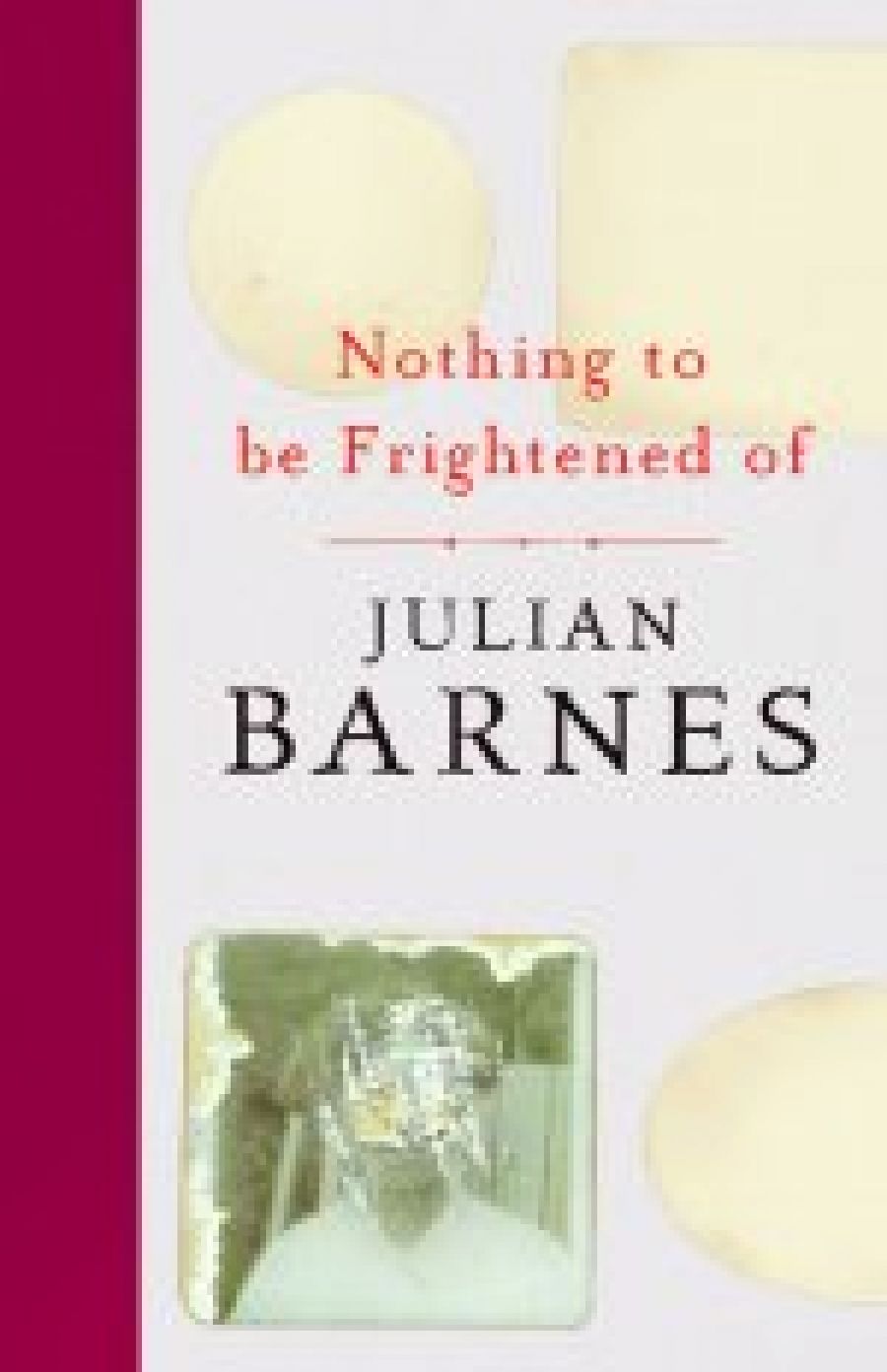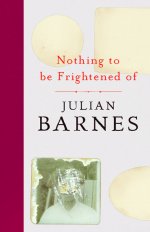
- Free Article: No
- Contents Category: Memoir
- Review Article: Yes
- Article Title: The titular nothing
- Online Only: No
- Custom Highlight Text:
‘Let’s get this death thing straight’, declares Julian Barnes in his recently published memoir-cum-meditation Nothing to Be Frightened Of. He sets out to confront mortality, the titular ‘nothing’, but manages only to peer at it through parted fingers. He takes short peeks, which calls to mind the title of his death-haunted novel Staring at the Sun (1986).
- Book 1 Title: Nothing to Be Frightened Of
- Book 1 Biblio: Jonathan Cape, $55 hb, 250 pp
- Book 1 Cover Small (400 x 600):

- Book 1 Cover (800 x 1200):

Like Chekhov’s Masha in The Seagull, Barnes mourns for his life, raging at the appalling fact of death, the fear of which is an essential part of him. It can render him incoherent and it shames him. In the book he berates himself for being a writer who, to his mind, cannot adequately articulate his fears nor their root cause. To Barnes, we are all amateurs learning how to mourn.
It is as if Barnes, albeit alive and well, is sampling in no particular order the five stages of grief associated with dying. In denial, he tells himself that his nocturnal panic episodes are book research. Then he offers to give up writing if death could be got rid of. Barnes is melancholic and sometimes finds life overrated, but death’s not-negotiable nature angers him. Barnes ponders immortality. Perhaps he should consider Simone de Beauvoir’s words, ‘If you love life, immortality is no consolation for death’. The final stage of grief is acceptance – for Barnes this is impossible.
Whilst it is symptomatic of our death-denying yet death-obsessed culture, the book is much more. Barnes’s response to brutal truths is to yield to the lure of contemplation and discursive tangents. The book’s opening, ‘I don’t believe in God, but I miss Him’, reveals the consolations unavailable to Barnes, the atheist turned agnostic. Religion’s attractions cannot rid him of his fear and he thus rejects an afterlife, relieved at not having to be reunited with his mother.
Reflections on family provide the book with narrative impetus and unsettling revelations. Barnes describes his parents as decent but devoid of emotion; they induced in him ‘a sort of stunned boredom’. His undemonstrative father, repressed and morose in old age, never told Barnes that he loved him. His garrulous, domineering mother is an unsympathetic figure who chastised him for having too much imagination and thought his first novel ‘a bombardment of filth’. Visiting her in hospital, Barnes felt overwhelming dread, ‘the feeling that time was being sucked from my life’. Barnes bristles with resentment when referring to his mother.
The running dialogue between Barnes and his philosopher brother Jonathan about the unreliability of memory reveals the contrast and rivalry between them. Barnes is urbane, funny, laconic. His ponytailed sibling, who dresses in eighteenth-century garb, is eccentric, rigorous and rational. They almost never agree.
Needing a salve for his fear, Barnes examines the life, work and death of great novelists and artists, gleaning words and wisdom he finds appealing, sometimes compelling but never convincing or comforting. Their effect on him parallels a French epigram he quotes: ‘The advice of the old is like the winter sun: it sheds light but does not warm.’ One wants to shake Barnes and remind him of Hamm’s cry in Samuel Beckett’s Endgame: ‘You’re on earth, there’s no cure for that.’ Barnes is witty and entertaining in tackling mortality, but his trademark eloquence eludes him. Riffs often descend into rants. An agitated tone pervades the book, and it is less frank than it appears. Barnes resists exploring whether his death-awareness relates to being a writer, and fears that this may diminish his literary powers. To Barnes, death is no artist, for it denies life.
Yet Nothing to Be Frightened Of contains much to admire. It is a poignant act of self-exposure, the sort from which most people recoil. Its achievement is in compelling the reader to conduct a similar exploration and it thus becomes a challenging experience. Barnes meticulously teases out his fears; it is like spinning a prism to see how different colours play out against the light. His riposte to death feels like an act of preparation, for he cannot trust himself should the awful moment arrive. Barnes is seeking courage. ‘But who can teach us to die?’ he asks.
Barnes should look no further than journalist Pamela Bone (Bad Hair Day, 2007), author Donald Horne (Dying: A Memoir, 2007) or publisher Diana Athill (Somewhere towards the End 2008) for honest, intimate examples of life-affirming bravery in the face of oblivion. And José Saramago’s Death at Intervals (2008) shows fiction’s ability to deny death its power.
To Julian Barnes the final word: ‘We live, we die, we are remembered, we are forgotten.’
This review is the winner of the the 2008 ABR Reviewing Competition.


Comments powered by CComment